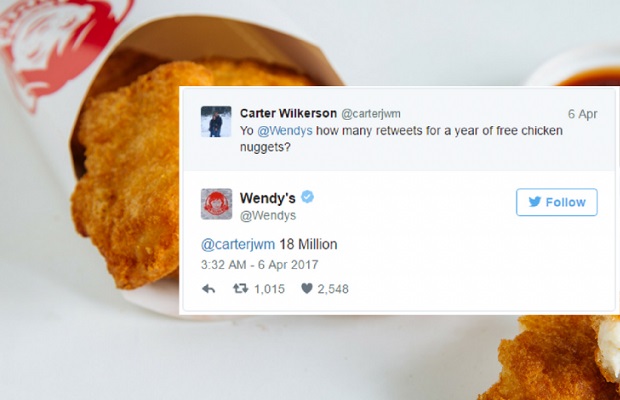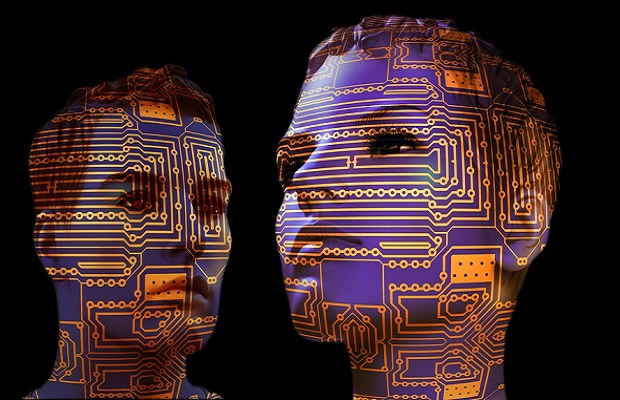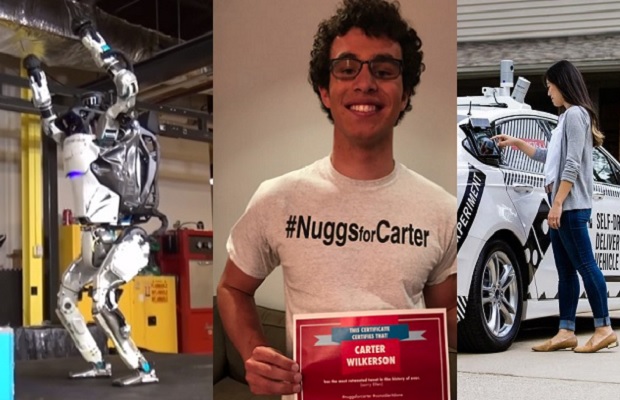From back-flipping robots to one teen’s Twitter quest for free nuggets, technology took us in some strange directions during 2017. In this special article, we celebrate the 12 weirdest news stories of the year.
Amazon plans flying warehouses: Drone deliveries from the sky?
Early on in the year, Amazon submitted a patent application for a futuristic flying warehouse that floats thousands of feet in the air, from which the online retailer could dispatch swarms of delivery drones to key areas. Flying at up to 45,000 feet, the warehouses would be suspended by cables from zeppelin-style airships, and stocked with popular items.
I just unearthed the Death Star of #ecommerce via @cbinsights… AMZN patent for airborne warehouses at 45K ft spitting out delivery drones pic.twitter.com/qEz2ilUtJP
— Zoe Leavitt (@zoe_leavitt) December 28, 2016
#NuggsforCarter: Wendy’s rewards teen for record-breaking tweet
One teen’s mission for a year’s supply of free chicken nuggets became Twitter’s most retweeted post of all time back in May. Carter Wilkerson’s post asking US chain Wendy’s how many retweets he needed for a year’s supply of nuggets has now been shared on the social media site more than 3.42 million times. The post, which read “Help me please. A man needs his nuggs”, surpassed TV star Ellen DeGeneres’s Oscars selfie from 2014 that featured a host of Hollywood stars, to reach top spot. “We did it guys! Thanks to you’re help and support we were able to raise $100k for DTFA and beat TheEllenShow record! Now let’s get 18mil!”,” he wrote.

Facebook seeks to calm AI fears after bots ‘invent own language’
Facebook sought to quell fears following (false) reports that it shut down an AI experiment due to the bots “inventing their own language”. The experiment, conducted in June, pitched two chatbots together to try and negotiate with each other over a trade, attempting to swap hats, balls and books, each of which were given a certain value. But they quickly broke down as the robots appeared to chant at each other in a language that they each understood but which appears mostly incomprehensible to humans. Crucially, they were not told to use comprehensible English, allowing them to create their own “shorthand”, according to researchers.

Boston Dynamics’ Atlas robot does backflips
Boston Dynamics has showcased its latest invention- a robot capable of leaping across tables and performing backflips. The company, formerly owned by Alphabet and bought bu Japeanese firm Softbank earlier this year, released footage showing a new robot jumping and even doing a backflip as it performs a gymnastics routine.
Amazon Key lets delivery drivers unlock customers’ doors
In October, Amazon launched a service that lets couriers open people’s front doors and put deliveries inside, provided they have the right equipment installed. The service will work if a user has a smart lock and Cloud Cam camera. Couriers will scan a package barcode and once the delivery has been verified online, the camera will start recording and the delivery person will be able to unlock the door using an app.
Cool or creepy? Google AI camera “decides when to take photos”
Google launched Clips in October, a Go Pro rival with an AI twist. The camera actually chooses when to snap pictures, using machine learning technology to automatically begin recording when notable actions are detected. Those could include a child cracking a smile or a dog entering the frame.
Domino’s teams with Ford for self-driving pizza delivery cars
Domino’s trialled self-driving delivery cars in the US, following a partnership with Ford, to deliver pizza to Domino’s customers in Michigan. The aim was not to test if self-driving cars work, but to see if customers are happy to go out of their homes to collect the pizza from an empty car.
Spotify accused of padding playlists with fake artists to save on royalties
Spotify was forced to deny filling popular playlists with ‘fake artists’ in order to save of paying royalties to artists. In a list, compiled by Music Business Worldwide (MBW), 50 artists were found in Spotify playlists that did not exist (or had a very small presence) anywhere else.

Unilever Africa uses online gaming to select new staff
Unilever introduced a digital recruitment programme that used online gaming to select the best candidates.The Unilever Digital Recruitment Programme is an online initiative that mixes gaming with video interviews to find the best graduates. The selection method includes an online application form, before playing a series of games for no longer than 20 minutes.

Amazon Echo Look judges your fashion selfies with AI camera
Amazon has unveiled its first Echo device with a built-in camera, capable of dispensing fashion device over your choice of clothing each day. The $200 Echo Look uses a depth-sensing camera and LED lights for style selfies and fashion advice. It lets people take full-length photos and videos of their outfits using just their voices, so they can more easily compare looks and share their fashion pictures with friends.
Salesforce ‘Einstein’ AI can tell when people are angry in texts and emails
Salesforce ramped up its artificial intelligence tools with additions to its ‘Einstein’ marketing platform for brands. Traditional keyword-based tools have trouble with complex wording or sarcasm, but this tool is designed to deal with these. Einstein Sentiment, which can sort the tone of any given text as positive, negative or neutral. Developers can use this to create an application that can highlight angry tweets and emails.

Facebook plans to build a village in Silicon Valley
In July, Facebook revealed plans to build 1,500 new homes including supermarkets, swimming pools and a visitors’ centre, near its offices in Menlo Park, California. The move was an attempt to address a severe housing shortage causing tension between Silicon Valley and local communities.


